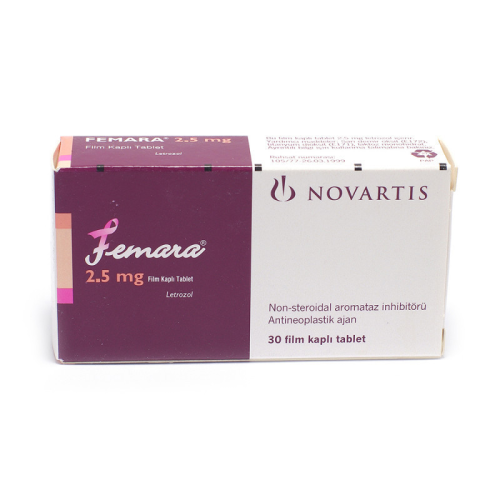ACTIVE HALF-LIFE
2 days
CLASSIFICATION
Non-steroidal aromatase inhibitor
DOSAGE
0.5 - 2.5 mg/day
ACNE
No
WATER RETENTION
No
HBR
No
HEPATOTOXICITY
No
AROMATIZATION
No
MANUFACTURER
Novartis
WAREHOUSE
International Warehouse 2
SUBSTANCE
Letrozole
,
Femara, produced by Novartis, is an anti-estrogen medication that is widely utilized in both medical and athletic settings. In healthcare, it is primarily prescribed for the treatment of estrogen-related conditions, such as breast cancer in women. In sports, it is used to mitigate the negative effects of estrogenic steroids, which can lead to issues like water retention and gynecomastia in men, among other concerns.
This non-steroidal aromatase inhibitor contains Letrozole as its active ingredient. It is recognized for its safe application in humans, as it is not a steroid and does not exhibit androgenic properties; it is also not considered toxic, does not harm the liver, and is not a narcotic or addictive.
Effects of FemaraAfter ingestion, Femara functions by inhibiting aromatase, an enzyme essential for estrogen production. Its action is linked to the inhibition of the cytochrome P450 system involved in aromatase activity. With prolonged use, the drug can result in a reduction of estrogen levels by 75-95% from initial levels.
Femara is classified as a third-generation aromatase inhibitor. Anastrozole is a similar drug in this class, while Clomid and Nolvadex act differently, as they are estrogen receptor antagonists; these do not inhibit estrogen production but instead bind to estrogen receptors in the body, resulting in different effects.
Notably, Femara is generally considered a safe option when used according to guidelines, with minimal side effects. However, individuals with specific predispositions or those who misuse the medication may experience complications affecting the digestive system (such as nausea or dry mouth), central nervous system (like dizziness or depression), respiratory system (including shortness of breath or cough), and musculoskeletal system (ranging from joint pain to osteoporosis). In cases of overdose, symptomatic treatment is recommended.
Usage Guidelines for Femara: Dosage, Cycle, and ReviewsFemara is administered orally, regardless of meals; it is promptly and fully absorbed by the gastrointestinal tract, achieving a bioavailability of 99%, with no significant impact from food consumption.
The recommended dosage ranges from 0.25 to 2.5 mg daily, tailored to the individual's needs and how well they tolerate the medication. Use of the drug can follow one of two protocols: (1) a preventative approach to avoid estrogenic side effects during steroid use, or (2) an adjunctive treatment during a steroid cycle once estrogen-related complications arise. In either case, Femara is effective in preventing estrogen-related issues like water retention, fat accumulation, and male gynecomastia.
Before beginning Femara, it is essential to assess potential risks. A consultation with a healthcare professional is advised to rule out contraindications, which include pregnancy, breastfeeding, and specific endocrine conditions in women, as well as substance intolerance and hypersensitivity in both men and women, along with considerations for children's use.
Additionally, caution is recommended for those with glucose-galactose malabsorption, lactase deficiency, or lactose intolerance due to possible adverse effects. Generally, no dose adjustments are necessary for this medication.
Keep out of reach of children. Intended for adult use only.
Warnings:
